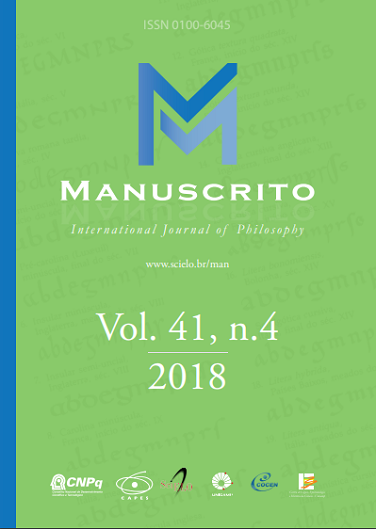Resumo
The perennial appeal of Kantian ethics surely lies in its conception of autonomy. Kantianism tells us that the good life is fundamentally about acting in accordance with an internal rather than an external authority: a good will is simply a will in agreement with its own rational, self-constituting law. In this paper, I argue against Kantian autonomy, on the grounds that it excessively narrows our concept of the good, it confuses the difference between practical and theoretical modes of knowing the good, and it cannot respect the essential efficacy of the principles of practical reason.Referências
AQUINAS, T. Summa Theologiae [ST] Opera Omnia. Leonine Edition, 1882.
ARISTOTLE. Nicomachean Ethics [EN] Trans., by C. Lowe, Oxford: Oxford University Press, 2002.
AUFDERHEIDE, J., BADER, R.M. The Highest Good in Aristotle & Kant. Oxford: Oxford University Press, 2015.
BUSS, S., OVERTON, E. Contours of Agency: Essays on Themes from Harry Frankfurt. Cambridge, Mass.: MIT Press, 2002.
ENGSTROM, S. The Form of Practical Knowledge. Cambridge, Mass.: Harvard University Press, 2009.
ENGSTROM, S. “Understanding Autonomy: Form and Content of Practical Knowledge” In E. Watkins (ed.) (2017), pp. 44-60.
ENGSTROM, S. “The Complete Object of Practical Knowledge.” In J. Aufderheide and R. M. Bader (eds.) (2015), pp.129-157.
FLANNERY, K. Action and Character According to Aristotle: The Logic of the Moral Life. Washington, D.C.: Catholic University of America Press, 2013.
FOOT, P. Natural Goodness. Oxford: Oxford University Press, 2001.
FREY, C., FREY, J.A. “G.E.M. Anscombe on the Analogical Unity of Intention in Perception and Action.” Analytic Philosophy, 58, 3, 2017, pp. 202-247.
FREY, J.A. “How to be an Ethical Naturalist.” In J. Hacker-Wright (ed.) (2018), pp. 47-84.
GEACH, P. “Good and Evil.” Analysis, 7, pp. 32-42, 1956.
HACKER-WRIGHT, J. Philippa Foot on Goodness and Virtue. Palgrave macmillan, 2018.
HERMAN, B. Moral Literacy. Cambridge, Mass.: Harvard University Press, 2007.
HILL, T.E. “Kantian Autonomy and Contemporary Ideas of Autonomy.” In O. Sensen, (ed) (2013), pp. 15-31.
KANT, I. Grundlegung zur Metaphysik der Sitten, 1785 [G]. Trans. By M. Gregor and J. Timmermann, Cambridge: Cambridge University Press, 2012.
KORSGAARD, C. The Sources of Normativity. Cambridge: Cambridge University Press, 1996.
KORSGAARD, C. The Constitution of Agency. Oxford: Oxford University Press, 2008.
KORSGAARD, C. Self-Constitution: Agency, Identity, and Integrity. Oxford: Oxford University Press, 2009.
MACINTYRE, A. Dependent Rational Animals. Chicago: Open Court, 1999.
MORAN, R. Authority and Estrangement: An Essay on Self-Knowledge. Princeton: Princeton University Press, 2001.
MORAN, R. “Frankfurt on Identification: Ambiguities of Activity in Mental Life.” In S. Buss., L. Overton, (eds.) (2002), pp. 189-217.
O’HEAR, A. Modern Moral Philosophy. Cambridge: Cambridge University Press, 2004.
THOMSON, J.J. Normativity. Chicago: Open Court, 2008.
THOMPSON, M. “Apprehending Human Form.” In A. O’Hear, (ed.) (2004), pp. 47-74.
THOMPSON, M. Life and Action. Cambridge, Mass.: Harvard University Press, 2008.
VELLEMAN, D. Self to Self. Cambridge: Cambridge University Press, 2006.
WATKINS, E. Kant on Persons and Agency. Cambridge: Cambridge University Press, 2017.

